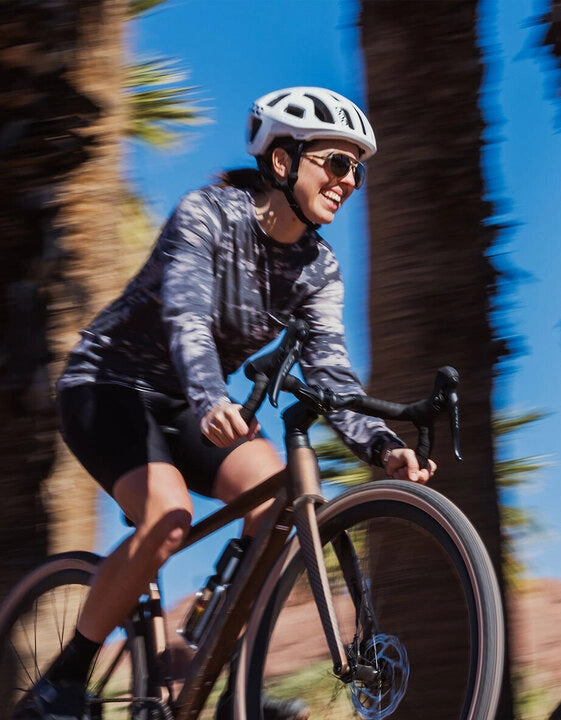Fat Bikes For Sale - New & Used Bikes
Shop certified pre-owned used bikes at TPC - The Pro's Closet. Browse popular fat bike brands like Trek, Specialized, Giant and more for the best mountain, road, and gravel bikes.
TPC - The Pro's Closet is the leader in buying and selling new and Certified Pre-Owned used bikes. With over 160,000+ customers served and 46,000 bikes sold. Talk to an expert Ride Guide today to find the right fat bike for you. Learn more about fat biking in our Fat Biking 101 Guide

Drivetrain Type
Condition
Color
Year
Price
$
to
$
2 products
Filter your results, save your search, then get emailed when new matching products arrive.
Not finding what you're looking for?
Let us know the products you're interested in and we'll let you know when they're available
Bikes are meant
to be used.
Learn More
Every season is prime riding season with a fat bike. Extra-wide fat bike tires create a much larger contact patch than normal MTB tires that lets a fat bike “float” over loose terrain and find traction where regular mountain bikes might struggle. Take them to a sandy beach or pedal your favorite local loop when it’s covered in snow during the middle of winter. Or just hit regular singletrack trails and gravel paths with unmatched comfort and confidence. With a fat bike, the variety of terrain and conditions you can explore expands dramatically.
What are fat bikes good for?
Fat bikes are the Swiss Army knives of the cycling world. They're versatile and can tackle terrain that would make other bikes cry for mercy. Here's what they're great for:
- Snow and sand riding: This is where fat bikes shine. Those massive tires (we're talking 3.8 inches wide or more) give you amazing float and traction on soft, shifty surfaces. So whether you're cruising snow-covered trails or hitting the beach, you're good to go.
- All-season trail riding: Fat bikes let you keep shredding trails year-round, even when conditions get sketchy.
- Adventure and bikepacking: These bikes are built for exploring. They can handle rough terrain, and many come with mounting points for all your gear. Perfect for multi-day wilderness adventures.
- Comfort riding: The high-volume, low-pressure tires act like built-in suspension, soaking up bumps and vibrations. It's like riding on a cloud.
- Unique riding experience: Fat bikes are just fun. They have a totally different feel compared to other bikes, and you can't help but smile when you're rolling on those massive tires.
Are fat bikes harder to pedal than regular mountain bikes?
Yes, fat bikes can feel a bit more challenging to pedal, especially when you're first starting out, but it's not as dramatic a difference as you think. The extra weight and rolling resistance from those massive tires do require a bit more effort, particularly when you're trying to get up to speed or tackling steep climbs. However, once you're moving, fat bikes can roll surprisingly well. Plus, in certain conditions like soft snow or sand, you might find yourself pedaling with ease while your buddies on regular mountain bikes are spinning their wheels. It's all about adjusting your riding style and expectations. Fat biking is more about the journey and the unique terrain you can explore rather than setting speed records.
The Best Fat Bikes: Fat Tires Matter
It's safe to say that fat bikes have come a long way since builders were creating double-rim double-tire bikes like the 1992 Clark-Kent fat bike that was built to ride the snowy course of the legendary Iditabike race. Now, modern fat bikes are lighter and more refined than ever.
Fat bikes typically use 26” wheels and tires (though there are a few 27.5” fat bikes too).
In general, fat bikes can be categorized as either 4” fat bikes or 5” fat bikes, which refers to the tire width the frame is designed to clear. 4” fat bikes generally fit 3.8-4.0” wide fat bike tires while 5” fat bikes generally clear 4.6-4.8” wide fat bike tires. 4” fat bikes are lighter and more nimble, while 5” fat bikes have more “float” due to the wider tires. 4” fat bikes are generally better for all-around riding while 5” bikes are best for the loosest conditions like fresh powder and unpacked snow.
Rigid, Hardtail, and Full-Suspension Fat Bikes
Most fat bikes will either be rigid bikes with no suspension or hardtails with a fat bike-specific suspension fork. Suspension generally isn’t necessary for fat bikes because the extra-wide tires allow them to run very low tire pressures, typically sub-10 PSI for those fresh pow days. There are a few full-suspension fat bikes, but they’re extremely rare, and most major manufacturers don’t make full-suspension fat bikes because they heavy and complicated.
Lucky for you, The Pro’s Closet has a large variety of fat bikes so you can choose the best option for your riding preferences. Be it the popular Specialized Fatboy or the elusive full-suspension fat tire bike, the Salsa Bucksaw, TPC will help you find the ultimate used fat bike.
Specialized Fat Bikes
The Specialized Fat Boy is the premiere fat bike from the big S, and one of the most popular fat bike models on the market. It’s able to clear massive 4.6” tires which provide a hovercraft-like feel over any terrain.
Trek Fat Bikes
The Wisconsin-based manufacturer produces the Fatboy’s biggest rival, the Trek Farley. With multiple build options available that can fit any price point, the Trek Farley is perfect for those just getting into the fat bike game or riders looking to obtain the ultimate fat bike build.
Every CPO bike is cleaned, tuned and tested at our Colorado headquarters. Sell Your Gear today and we can make an offer for your bike, frame, or wheelset within two business days and help you avoid the frustration and renegotiation of the secondary market.



